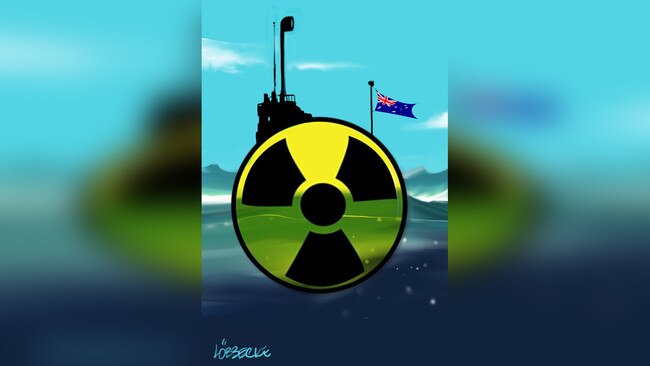Nuclear energy is hardly an option — it’s a must

In an attempt to prop up the re-election prospects of former Liberal minister Christopher Pyne, the Turnbull government inked a deal that undermined our defence capability while also guaranteeing an explosion in defence spending.
This egregious combination of pork-barrelling, budget blowouts, dumb defence decisions and ministerial incompetence is not a rarity in modern politics but it has never been seen on the scale of the decision to award Australia’s new submarine contract to the French defence contractors.
Only the vainglorious could believe that redesigning a nuclear submarine to use diesel power would deliver the outcomes Australia needs from its future submarine fleet. In fact, it’s difficult to see how any diesel-powered submarines could really fulfil our national requirements. They are ideal for shallow-water stealth missions but lack the long-term surveillance and strategic capability of the nuclear vessels.
However, the diesel v nuclear option wasn’t even a consideration because of a more enduring political stupidity than ministerial boondoggles. The decision to prohibit the development of a nuclear industry in Australia, on the basis of multi-decade alarmist claptrap, has cost this country dearly.
While not wishing to appease climate-change catastrophists, the only viable response to their demands for carbon dioxide abatement while maintaining our standard of living is nuclear power. That this successful, safe and proven option is not countenanced by the green lobby demonstrates how its alarmism is as fake as its save-the-world rhetoric.
An Australian nuclear industry would serve our country in myriad ways. Most obviously, it would open up the opportunity for emissions-free baseload power using one of our most abundant resources. In coastal areas, the cooling process could be coupled to a desalination plant that would provide almost limitless fresh water for irrigation or potable use.
The irrigation potential of such a process could transform vast swaths of our arid regions, enabling higher-value crops to replace dryland farming commodities.
There are 440 nuclear power reactors worldwide, generating about 10 per cent of the world’s electricity. They are the second largest source of low-carbon power, operational in 30 countries worldwide but exporting electricity to many more.
Many of these countries depend on Australia’s mined uranium to operate but it is an advantage our political class denies to its own citizenry.
Australia’s known uranium resources are the world’s largest and comprise about a quarter of our energy exports, yet we are unable to use them for domestic benefit, with the single exemption of a multipurpose reactor located in the Sydney suburb of Lucas Heights.
While Australia’s 20-megawatt Open Pool Australian Lightwater reactor is used primarily for medical, scientific and research purposes, its suburban locale demonstrates how the green-inspired fictional horror of a nuclear industry is more political expediency than lived reality.
However, it is this fictionalised nuclear horror story that has seen successive governments unprepared to embrace the unbridled potential that nuclear offers. Our leading scientists have told me that modern nuclear technology is safer than most comparable options, irrespective of the claimed climate benefits.
Nuclear critics often cite the storage and processing of waste as a deal-breaker for nuclear power, but they conveniently ignore the capacity of countries with less political and geological stability than Australia to manage and profit from the exact same process.
Few turn away from prestigious French wines or France’s lucrative tourism industry because that country generates 75 per cent of its power through nuclear fission, while also storing and processing nuclear waste.
The same can be said of many other countries where governments have had the temerity to take on the hypocritical green lobby and its regressive anti-human stance. Unfortunately, this political cowardice doesn’t just affect our power potential. It now has had a demonstrable impact on our national defence capability as regards the Turnbull submarine contract.
Rather than acknowledge the respective benefits that nuclear and diesel submarines offer, we have embraced the worst of both worlds by requisitioning a nuclear sub powered by diesel engines simply because political cowardice won’t support the development of a nuclear industry here.
If it weren’t for this political intransigence, we could be ready to build German or Japanese-designed diesel submarines in Australia while strengthening our relationship with the US through commissioning its nuclear boats for our domestic use.
The end result will be billions in wasted dollars, decades of delay and a shameful compromising of our national defence capability.
Australia’s determination not to embrace the economic, defence, environmental and research potential that a nuclear industry offers marks the greatest political failure of the past two decades. It has cost our nation significant global investment and scientific advances through collaboration on new nuclear technologies.
Nowhere is this better demonstrated than the worst defence contract in the history of the nation. If it does nothing else in the national interest, the Morrison government would be wise to tear up the existing submarine contract and push the parliament to end the moratorium on a nuclear industry in Australia.
Cory Bernardi was a senator for South Australia from 2006 to this year.



Arguably the worst government contract in Australia’s history was entered into for shameless political expediency.